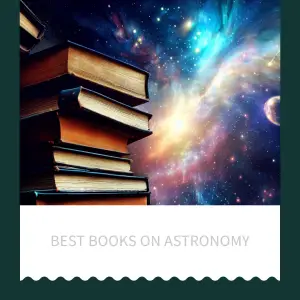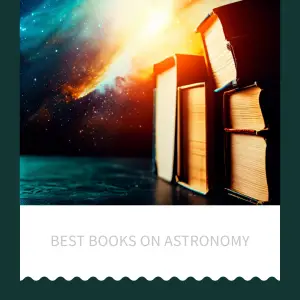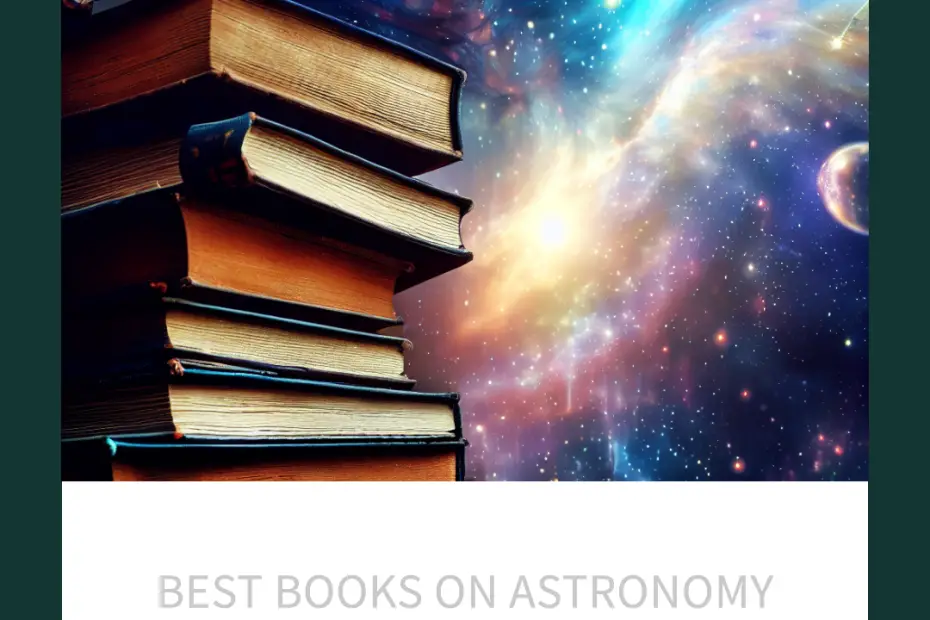
Looking to reach for the stars without leaving your cozy reading nook? Look no further! We’ve scoured the galaxy to bring you the best books on astronomy.
From stargazing adventures to mind-blowing cosmic facts, prepare to have your universe expanded! Keep reading to navigate the celestial wonders with ease.
Basics of Astronomy
A. Overview of Astronomy as a Science
Before we delve into the best books on the subject, let’s take a moment to understand what astronomy is all about.
Discover Your FREE Personalized Moon Reading NowAstronomy is the scientific study of celestial objects, phenomena, and the larger universe as a whole.
It examines planets, stars, galaxies, and other celestial bodies, aiming to unravel their origins, behavior, and interactions.
B. Introduction to Celestial Bodies and Observational Techniques
Observing the night sky is an ancient practice that has evolved over time.
From simple naked-eye observations to powerful telescopes and space probes, astronomers have employed various techniques to uncover the secrets of the cosmos.
Understanding these observational methods will help us appreciate the discoveries presented in the recommended books.
Discover Your FREE Personalized Moon Reading NowBest Books for Beginners

A. “Cosmos” by Carl Sagan
- Synopsis and Background of the Book
“Cosmos” by Carl Sagan is a masterpiece that takes readers on an extraordinary journey
through space and time. Published in 1980, this book accompanied a groundbreaking television series of the same name.
Dr. Carl Sagan, a renowned astrophysicist and science communicator, skillfully weaves scientific concepts with philosophical insights to paint a vivid portrait of the cosmos.
- Key Concepts Covered
From the Big Bang to the evolution of galaxies and the emergence of life on Earth, “Cosmos” covers a wide range of astronomical topics.
Discover Your FREE Personalized Moon Reading NowSagan elegantly explains complex theories such as relativity and quantum mechanics, making them accessible to the general reader.
- Impact and Popularity of the Book
“Cosmos” became an instant bestseller and remains one of the most popular science books ever published.
Sagan’s passion for science and the universe shines through his words, inspiring generations of readers to explore the wonders of astronomy.
B. “A Brief History of Time” by Stephen Hawking
- Overview of the Book’s Content
“A Brief History of Time,” authored by the iconic physicist Stephen Hawking, is a groundbreaking exploration of the universe’s origins, structure, and eventual fate.
First published in 1988, the book delves into cosmology and the nature of time, offering a captivating glimpse into the mysteries of the cosmos.
Discover Your FREE Personalized Moon Reading Now- Explanation of Complex Concepts in Simple Language
Despite dealing with profound scientific concepts, Hawking’s writing style is remarkably lucid and engaging.
He artfully breaks down complex ideas, like black holes and the nature of space-time, into easily digestible explanations for the curious reader.
- Why It’s Recommended for Beginners
“A Brief History of Time” is the ideal starting point for anyone with an interest in astronomy.
It lays the foundation for further exploration while challenging readers to contemplate the deepest questions about the universe.
C. “Astrophysics for People in a Hurry” by Neil deGrasse Tyson
- Book Overview and Target Audience
In “Astrophysics for People in a Hurry,” Neil deGrasse Tyson, a prominent astrophysicist and science communicator, offers a delightful crash course in astrophysics.
Discover Your FREE Personalized Moon Reading NowThis compact book is tailored for busy readers who seek a quick and engaging overview of the cosmos.
- Bite-sized Explorations of Astrophysical Concepts
Tyson’s book is a treasure trove of cosmic knowledge, condensed into bite-sized chapters that explore various astrophysical concepts.
From the birth of stars to the search for extraterrestrial life, Tyson’s explanations are both informative and entertaining.
- Engaging and Accessible Writing Style
One of the book’s highlights is Tyson’s engaging writing style, which infuses humor and enthusiasm into even the most complex topics.
“Astrophysics for People in a Hurry” makes astronomy accessible and enjoyable for everyone, regardless of their background in science.
Discover Your FREE Personalized Moon Reading NowSpecialized Astronomy Books
A. “The Elegant Universe” by Brian Greene
- Focus on String Theory and Quantum Physics
“The Elegant Universe” by Brian Greene delves into the fascinating world of string theory,
a branch of theoretical physics that seeks to unify all known forces and particles in the universe.
Greene’s book offers an in-depth exploration of this complex and cutting-edge area of astrophysics.
- Merging Astrophysics with Fundamental Physics
Greene skillfully intertwines the principles of astrophysics with fundamental physics, presenting readers with a profound understanding of the universe’s fabric.
The book encourages readers to contemplate the universe’s hidden dimensions and the nature of reality itself.
Discover Your FREE Personalized Moon Reading Now- Reader’s Appreciation for the Universe’s Complexity
“The Elegant Universe” ignites a sense of wonder, leaving readers in awe of the universe’s intricate design and the potential marvels that await discovery.
B. “Death by Black Hole” by Neil deGrasse Tyson
- Exploring the Fascinating World of Black Holes
In “Death by Black Hole,” Neil deGrasse Tyson takes readers on a captivating journey through the cosmos, with a focus on one of its most enigmatic entities: black holes.
Tyson’s eloquence and expertise make this book an eye-opening and thrilling exploration.
- Entertaining and Informative Style
Tyson’s storytelling prowess shines through in this book, making it an informative yet highly enjoyable read.
He effortlessly navigates through complex astrophysical phenomena, unraveling the mysteries of the universe.
Discover Your FREE Personalized Moon Reading Now- Bridging the Gap Between Laymen and Astrophysicists
“Death by Black Hole” strikes a balance between catering to the layman reader and providing enough scientific depth to satisfy the curious minds of aspiring astronomers.
C. “The Fabric of the Cosmos” by Brian Greene
- Investigation of Space, Time, and the Nature of Reality
In “The Fabric of the Cosmos,” Brian Greene embarks on a thrilling exploration of space, time, and the fundamental building blocks of the universe.
Greene’s writing skillfully combines cutting-edge science with imaginative storytelling.
- Rich and Thorough Explanations
Greene delves deep into the complexities of modern theories, such as general relativity and quantum mechanics, unraveling their implications for our understanding of reality.
- Appeal to Readers Interested in Modern Theories
“The Fabric of the Cosmos” caters to readers with a keen interest in modern
Discover Your FREE Personalized Moon Reading Nowastrophysical theories, offering them a thought-provoking and rewarding reading experience.
History and Development of Astronomy
Astronomy, the oldest of the natural sciences, has a rich history that dates back thousands of years.
From ancient civilizations gazing at the night sky to modern-day space exploration, the journey of astronomy has been one of curiosity, exploration, and profound discovery.
Let’s explore some influential books that shed light on the history and development of this awe-inspiring science.
A. “The Discoverers” by Daniel J. Boorstin
- Surveying the History of Human Discovery
In “The Discoverers,” Daniel J. Boorstin takes readers on an intellectual adventure
Discover Your FREE Personalized Moon Reading Nowthrough time, delving into the great moments of human discovery that have shaped our understanding of the world.
From the voyages of explorers to groundbreaking scientific achievements, Boorstin weaves a narrative that celebrates the human spirit of curiosity and innovation.
- Astronomy’s Role in Shaping Civilization
Boorstin highlights the pivotal role astronomy played in ancient civilizations.
Observations of celestial bodies were critical for early societies to develop calendars, navigate vast oceans, and comprehend the cyclical nature of the cosmos.
Astronomy’s influence extended beyond science, impacting culture, religion, and governance.
Discover Your FREE Personalized Moon Reading Now- Insights into Historical Astronomical Achievements
“The Discoverers” offers fascinating insights into historical astronomical achievements,
such as the work of ancient astronomers like Ptolemy, whose geocentric model of the universe dominated Western thought for centuries.
Boorstin’s account serves as a reminder of how humanity’s pursuit of understanding the cosmos has transformed the course of history.
B. “The Copernicus Complex” by Caleb Scharf
- Examining the Revolution of Copernican Thought
In “The Copernicus Complex,” Caleb Scharf explores the profound impact of Nicolaus Copernicus and his revolutionary heliocentric model.
The book meticulously traces the Copernican Revolution and its consequences, which marked a significant shift in humanity’s perception of the cosmos.
Discover Your FREE Personalized Moon Reading Now- Impact on Human Perception of the Universe
Scharf delves into the Copernican Revolution’s influence on how humans perceive their place in the universe.
The realization that Earth was not the center of the cosmos challenged deeply ingrained beliefs and opened the doors to modern astronomy.
- Historical and Philosophical Perspectives
“The Copernicus Complex” not only provides historical context but also delves into the philosophical implications of Copernican thought.
Scharf explores how this groundbreaking shift in worldview influenced subsequent scientific inquiry and human philosophical reflections.
Astronomy Photography Books
Astronomy photography offers a breathtaking visual journey through the wonders of the cosmos.
Discover Your FREE Personalized Moon Reading NowThese books capture the beauty of space and serve as a testament to human ingenuity in capturing celestial moments.
A. “Picturing the Cosmos” by Terence Dickinson
- Showcase of Stunning Astronomy Images
“Picturing the Cosmos” by Terence Dickinson is a visual delight that presents a
collection of stunning astronomy images captured by both amateur and professional photographers.
From vibrant nebulae to distant galaxies, the book offers a mesmerizing gallery of celestial wonders.
- Informative Captions and Descriptions
Dickinson’s book goes beyond captivating images, providing informative captions and descriptions that add depth to each photograph.
Discover Your FREE Personalized Moon Reading NowReaders gain a deeper understanding of the celestial objects and phenomena depicted in the images.
- Inspiring Readers to Appreciate the Beauty of Space
Through its visual storytelling, “Picturing the Cosmos” inspires readers to appreciate the vast beauty of space and fosters a sense of wonder about the universe’s mysteries.
B. “Earth and Space: Photographs from the Archives of NASA” by Nirmala Nataraj
- Collection of Iconic NASA Images
In “Earth and Space,” Nirmala Nataraj curates a breathtaking collection of iconic images captured by NASA’s spacecraft and astronauts.
The book showcases stunning views of Earth, other planets, and celestial events captured from the vantage point of space.
- Historical Context and Importance of Space Exploration
Nataraj provides historical context for each image, underscoring the importance of
Discover Your FREE Personalized Moon Reading Nowspace exploration in advancing scientific knowledge and human understanding of the cosmos. The book pays homage to the extraordinary achievements of space missions.
- Perfect Blend of Science and Art
“Earth and Space” strikes the perfect balance between scientific discovery and artistic representation.
The images offer not only a scientific perspective but also an artistic appreciation of the cosmos.
Related Article: Rahu in Astrology: Understanding its Influence and Impact –
Advanced Astronomy Books
For those seeking a deeper understanding of astrophysical concepts, these advanced
Discover Your FREE Personalized Moon Reading Nowastronomy books offer comprehensive and rigorous insights into the mysteries of the universe.
A. “An Introduction to Modern Astrophysics” by Bradley W. Carroll and Dale A. Ostlie
- Comprehensive and Rigorous Introduction to Astrophysics
“An Introduction to Modern Astrophysics” by Bradley W. Carroll and Dale A.
Ostlie is a comprehensive and authoritative textbook that covers the breadth and depth of astrophysical knowledge.
It serves as a valuable resource for students and enthusiasts alike.
- Suitable for Advanced Undergraduates and Graduate Students
While accessible to advanced undergraduates, the book caters to the needs of graduate
Discover Your FREE Personalized Moon Reading Nowstudents pursuing a deeper understanding of theoretical and observational astrophysics. It explores topics ranging from stellar structure to cosmology.
- In-depth Exploration of Theoretical and Observational Concepts
Carroll and Ostlie delve into both theoretical models and observational techniques, providing readers with a well-rounded perspective on astrophysical concepts.
The book encourages critical thinking and engages readers in the process of scientific inquiry.
Related Article: Back Dimples Meaning in Astrology: A Celestial Guide –
FAQs About best books on astronomy
What book should I read about astronomy?
For beginners, “Cosmos” by Carl Sagan is an excellent choice. It beautifully explores the wonders of the universe in an engaging and accessible way.
Discover Your FREE Personalized Moon Reading NowWhat should I study if I love astronomy?
If you love astronomy, consider studying physics, astrophysics, or space science.
These fields will deepen your understanding of celestial objects and the laws governing the universe.
Who are the 5 great astronomers?
Five great astronomers in history are Nicolaus Copernicus, Galileo Galilei, Johannes Kepler, Isaac Newton, and Edwin Hubble.
Their contributions revolutionized our understanding of the cosmos.
What are 3 topics studied in astronomy?
Three key topics in astronomy are celestial bodies (stars, planets, galaxies), cosmology
Discover Your FREE Personalized Moon Reading Now(the universe’s origin and evolution), and astrophysics (physical properties and processes of celestial objects).
Where do I start with astronomy?
Start by observing the night sky with the naked eye or binoculars. Familiarize yourself with constellations, planets, and the moon.
Online resources and mobile apps can aid your stargazing journey.
Where should I start studying astronomy?
Begin with basic astronomy courses available at local community colleges or online platforms.
Books, documentaries, and podcasts on astronomy can also supplement your learning.
Discover Your FREE Personalized Moon Reading NowHow do I start studying space?
To study space, immerse yourself in astronomy and space-related subjects.
Join astronomy clubs, attend workshops, and participate in stargazing events to connect with the space community.
Is it a good idea to study astronomy?
Studying astronomy can be incredibly rewarding if you have a passion for the cosmos. It opens up exciting career paths in research, education, aerospace, and astrophysics.
Which subject is best for astronomy in class 11?
For class 11 students interested in astronomy, focusing on physics and mathematics will lay a strong foundation.
These subjects are essential for understanding the principles of the universe.
Discover Your FREE Personalized Moon Reading NowWhat is the hardest question in astronomy?
One of the most challenging questions in astronomy is unraveling the nature of dark matter and dark energy.
Despite extensive research, their mysterious properties continue to baffle scientists.
Final Thoughts About best books on astronomy
The world of astronomy is captivating, and the best books on this subject open doors to the wonders of the universe.
From classic works like Carl Sagan’s “Cosmos” to Neil deGrasse Tyson’s “Astrophysics for People in a Hurry,” these books make complex concepts accessible to everyone.
They ignite curiosity, inspire awe, and foster a deeper understanding of our place in the cosmos.
Discover Your FREE Personalized Moon Reading NowEngaging narratives, stunning visuals, and scientific rigor make these books invaluable resources for both beginners and enthusiasts.
As we gaze at the night sky, these books remind us that the pursuit of knowledge is as limitless as the universe itself.
